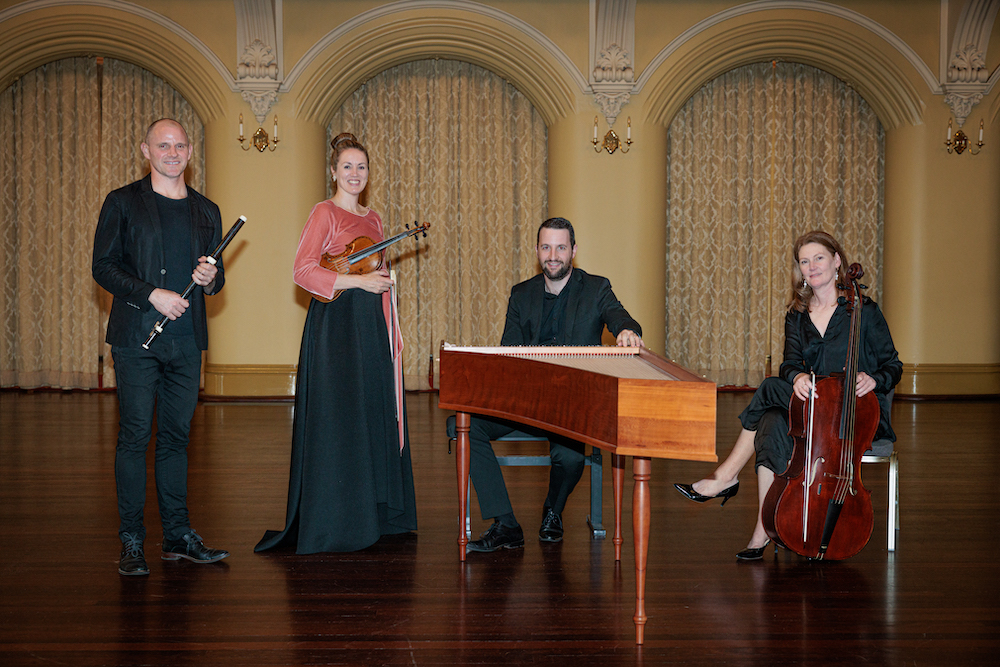French in name only, Telemann’s ‘Paris Quartets’ offer a suite of European flavours. Australian Baroque charms Claire Coleman with a polished performance.
Baroque tour of Europe one to savour
31 October 2022
- Reading time • 6 minutesMusic
More like this
- Rewriting tradition with skill and charm
- Close encounter stirs the soul
- The great unknown
‘An Afternoon in Paris’, Australian Baroque •
Government House Ballroom, 29 October 2022 •
German composer Georg Philipp Telemann’s “Paris Quartets” are anchored in stately Europeanism for “An Afternoon in Paris” with Australian Baroque. Government House Ballroom’s formal and decorous space is arranged in the round today, with the musicians in the centre, to suit Telemann’s chamber works.
Australian Baroque Artistic Director and violinist Helen Kruger is joined by Andy Skinner on flute, Noeleen Wright on cello, and James Huntingford on harpsichord. The musicians bring a dignified affection for Telemann’s quartets to their performances.
The “Paris Quartets” were named as such only in the 20th century, in reference to a trip Telemann made there in 1737, rather than for anything particularly French leaning in the music itself.
Instead, as Huntingford explains at the start of the concert, Telemann is a master of composing in the different national styles that were popular during the late Baroque. Not content to let this description stand alone, Huntingford sits at his instrument to demonstrate what he means, quoting a plodding Polish Polonaise and then a “gooey” French-influenced motif. The demo is engaging, and the introduction accessible.

The program begins with Telemann’s Quartet No.3 in G Major TWV 43. Australian Baroque’s interpretation brings a distinct conversationalism to these already dialogic works.
Skinner and Kruger strike a deft tonal balance when they are called upon to deliver harmonised phrases together, or to work in call and response. Skinner plays his Baroque flute with a warm tone, scampering delicately across busy phrases that might overpower in less deft hands. Kruger’s phrasing is elegant, ensuring she’s never second fiddle, regardless of who has the melodic lead.
Wright’s and Huntingford’s roles vary, sometimes holding down the continuo accompaniment, other times presenting more virtuosic motifs. Both musicians pop in and out of the foreground tastefully, cello and harpsichord sparkling in the exposed downbeat chords and overlapping the descending phrases which open the program’s second quartet, Concerto No.1 in G Major TWV 43. It is a shame that sound bleed from a wedding in the grounds outside interrupts here.
While the musicians’ performances can’t be separated in terms of virtuosity, which is as it should be in the teamwork-driven quartet format, Skinner garners a little extra scrutiny and warmth from the audience after his heartfelt introduction to the afternoon’s second work.
Explaining that his first flute teacher, Mrs Daniels, is in the audience, Skinner praises the importance of music teachers in the lives of their young students, and specifically Mrs Daniels’ role in his own life and the educational trajectory that brought him to this moment. Skinner’s vulnerability here is a welcome contrast to the otherwise coolly formal afternoon.

The final quartet, No 6 in E Minor TWV 43, contains a favourite moment; a few short phrases where flute, violin and cello move in rhythmic unison and three-part harmony, held together by the harpsichord, and interspersed with light and airy flute statements.
An encore of the Sonata No.1 in G major, Op. 12 by Louis-Gabriel Guillemain, a composer best known to flautists, rounds out the program.
Telemann’s signature interpretation of different countries’ Baroque compositional techniques is masterful in the “Paris Quartets”. One could argue that the only stylistic evocation these quartets make of their city namesake is of Paris’s cosmopolitanism.
Rather like the “French” reception preceding the concert, including French macarons, Turkish baklava, and sparkling wine from Faber Vineyard in our own Swan Valley, Telemann’s not-very-Parisian quartets are a set of tasty morsels united by European flavours. Australian Baroque continues to charm with each new performance idea.
Australian Baroque performs “An Afternoon in Paris” at Holmes à Court Gallery on 13 November 2022.
Pictured top: Andy Skinner, Helen Kruger, James Huntingford and Noeleen Wright make a wonderful quartet. Photo: Nik Babic/Artshoot Media
Like what you're reading? Support Seesaw.






